#is it bad that i just find bradley cooper easy to make fun of
Text
LAST TRAIN TO BLUE MOON CANYON FANCAST
ND #13
Joe Hardy - Felix Mallard
Frank Hardy - Corey Mychreest
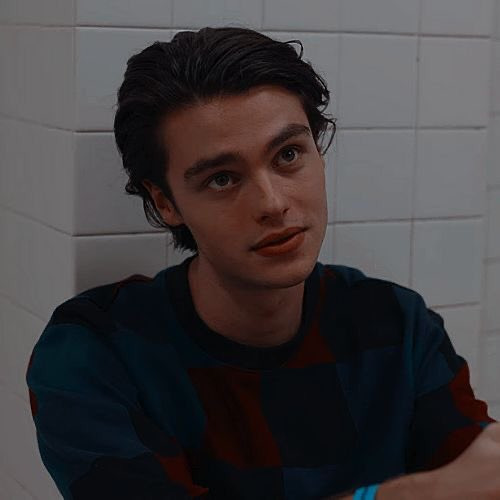
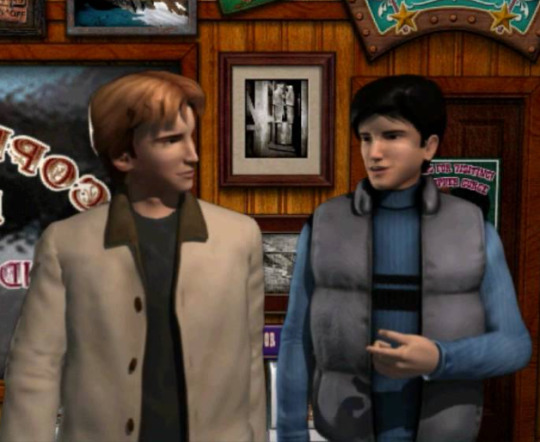
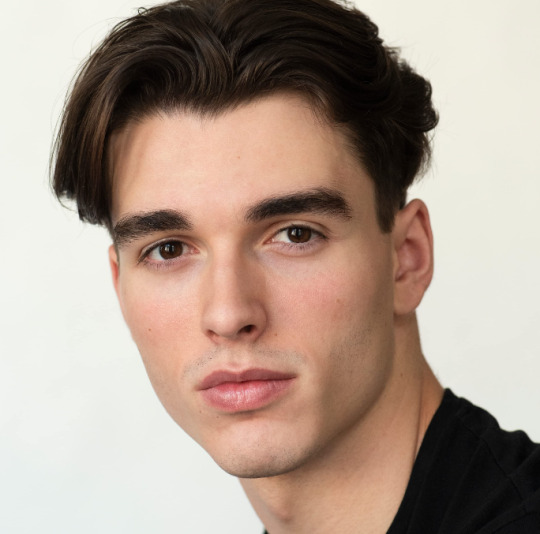
Lori Girard - Dakota Fanning

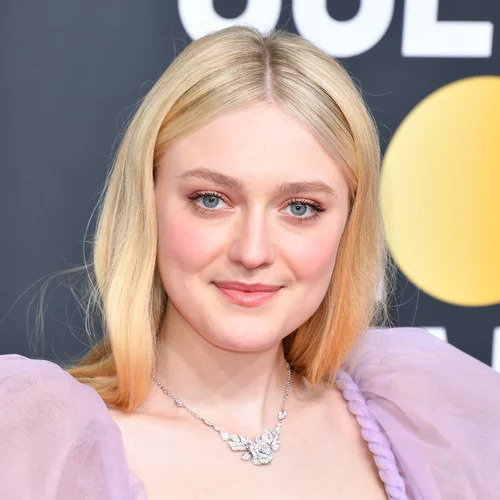
Tino Balducci - Bradley Cooper
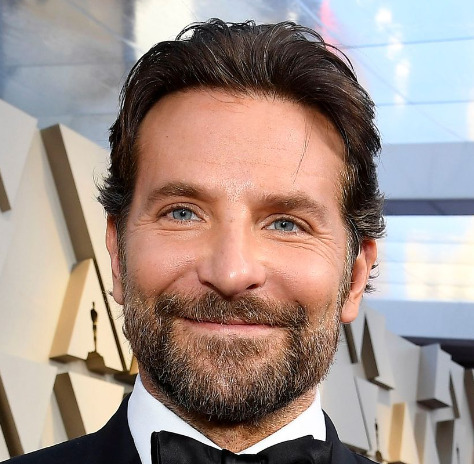
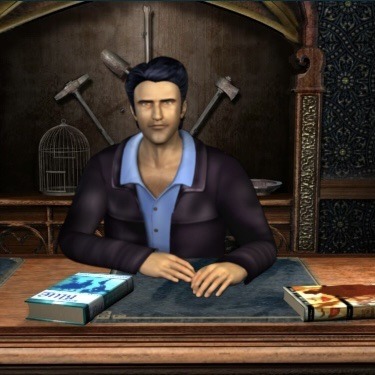
Charleena Purcell - Salma Hayek
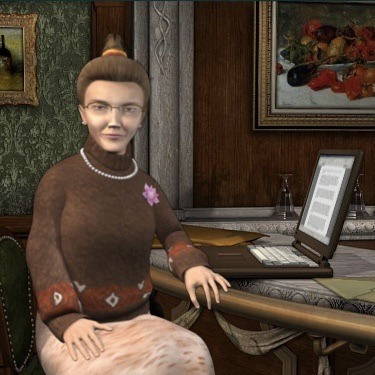

John Grey - Nathan Mitchell

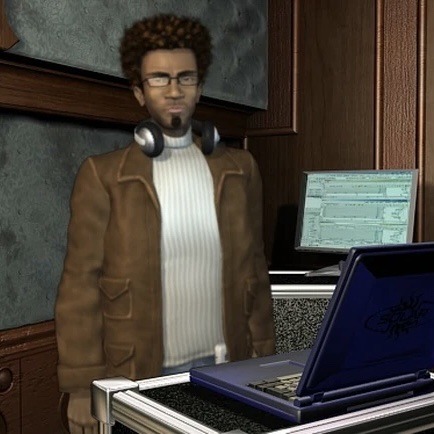
You wouldn't believe the lucky break we caught.
Lucky break? Hey, that was the result of good old-fashioned detective work.
It was the result of your insisting we stop for a cheeseburger.
MHM, TRT, FIN, SSH, DOG, CAR, DDI, SHA, CUR, CLK
#is it bad that i just find bradley cooper easy to make fun of#Also if salma hayek cant play an i dont care leave me alone unless you have top tier not dirt gossip for me#as i write my powerful and likely steamy romance novels#than no one can#nd#nancy drew game fancast#dream cast#game to movie adaptation#last train to blue moon canyon#TRN#John Grey#Charleena Purcell#Tino Balducci#Lori Girard#Frank Hardy#Joe Hardy#the hardy boys#I feel like i dont know how to cast fatima because she is her own ENTITY#aaaaaand frank and joe have always been HOTTIES because they formed my brain as a child as being the best...#but now they're just fulfilling their destiny
21 notes
·
View notes
Text
Leftist Magneto Rates Popular “Hot” Men
In honor of John Legend being rated this year’s “Sexiest Man Alive,” I thought I’d share my opinion on some dudes that the world seems to think are good-looking. I’ll try to base my opinion solely on looks, rather than personality or talent (or lack thereof).
Timothee Chalaalamalet - He kinda looks like a facial reconstruction of a long-dead person. I think he’s a skinny little rat. 0/10
Ryan Gosling - basic, boring. Not the worst but he’s just so dull. And not a good actor either but that’s beside the point. And his voice isn’t sexy enough to make up for the fact that he looks like a peanut. 3/10
John Legend - he looks like a baby 2/10
Matt Damon - 2007 must have been a dark time, because this ugly bastard was voted Sexiest Man Alive. This guy’s got the sex appeal of a houseplant. 0/10
Michael B. Jordan - I personally don’t think he’s that hot, but like if he was a good friend of mine and he said “hey fam am I hot” I’d probably say yeah and not feel like I’ve lied to him. 7/10
Hugh Jackman - Good smile, good heart. easy 10/10
Idris Elba - His natural accent sounds like he’s an American doing a fake British accent and it fucks me up. I don’t really see what’s so sexy about him tbh 4/10
Blake Shelton - I will never, ever, ever find a country singer attractive. Honestly Blake Shelton looks like some sort of tailypo-esque cryptid but in human form, like the angles and shit of his face are just off. 1/10
David Beckham - He has never been hot and if you think he has you need ya eyes checked. Another ratman. He looks like he knows something you don’t know (except that you probably actually do know it, he just has an inflated ego). 2/10
Chris Hemsworth - He seems like a fun guy, and he’s definitely the most attractive Chris, but he’s still so dull. 5/10
Channing Tatum - His parents are probably cousins, judging by his looks (I’m from Alabama, I’m allowed to say this). Ugly ugly man. 0/10
Bradley Cooper - Not to insult raccoons, but he looks like a mangey raccoon. 2/10
Johnny Depp - Awful person, awful actor, awful looks, especially in more recent years. It’s like all the misogyny and violence and alcoholism and bad personality has seeped into his skin. 0/10
Ryan Reynolds - He’s not the best-looking dude, but his wife is really gorgeous so I’ll let him have a 8/10
#terf#terfs please touch#terfs DO interact#terfs do touch#terfs please interact#radfem#radical feminism#terf safe#me
18 notes
·
View notes
Text
Epic Movie (Re)Watch #189 - Spy

Spoilers Below
Have I seen it before: Yes
Did I like it then: Yes.
Do I remember it: Yes.
Did I see it in theaters: Yes.
Was it a movie I saw since August 22nd, 2009: Yes. #358
Format: Blu-ray
1) So the movie starts by introducing us to a sort of typical white guy spy. A James Bond type, but without the British accent (for some reason). It starts with the familiar, the usual tropes, before really fucking them over when Jude Law (who for some reason is trying to do an American accent and he’s not doing it well) sneezes and accidentally kills a guy.
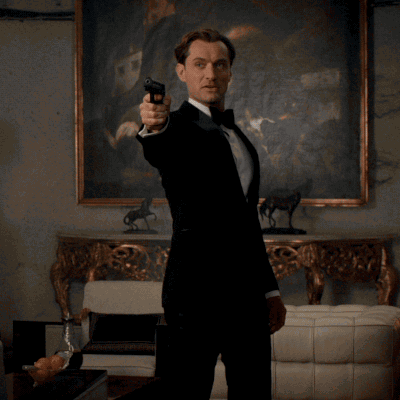
Which is an excellent joke to introduce is into the film’s wonderfully strong sense of humor. If you think you know how a trope is going to play out, you’re probably wrong. In fact, the entire opening sequence is a strong representative of how the film blends quality action with quality humor which will be consistent throughout the film.
2) Melissa McCarthy as Susan Cooper.

McCarthy is the foundation on which the rest of the film is built. From the very first minute we spend with her character she is established as not only good at her job but incredible at it. It is easy in spy spoofs for the main spy to be a bumbling idiot, but Susan’s continued competence is in fact one of the key factors which makes this film as incredible as it is. Especially considering the fact she does have some insecurities at the beginning, insecurities which are largely unfounded because she is fucking good at her job. McCarthy is able to have incredible warmth, heart, and vulnerability as Susan which she doesn’t always show in her film roles. But also when the script calls for it she can have this amazing brashness and humorous loudmouth/angry quality. Susan goes through an incredible transformation from the moment we meet her to the moment we leave her and McCarthy is able to play that absolutely perfectly. It’s HER story, it’s HER movie, and we are just along for the ride in an amazing way.
3) “Who Else Can You Trust?” is abbreviated in the film’s opening credits (I own the full version found on the album) but feels like a real Bond song with the opening credits feeling like a real Bond opening credits. This is part of the reason Spy is able to differentiate itself from other spy comedies like Austin Powers. It takes the genre, action, and stakes seriously throughout. This is real danger and true villains who are trying to get their hands on a nuke. It’s not like “oh, it’s funny because the spy is stupid and the bad guy’s want to kill all cats” or something like that. This sort of silly comedies can and have worked in the past, but Spy’s comedy is born out of its strong sense of characters and performances from the actor. Not by making fun of the genre, but embracing it in a wonderfully fun and funny way.
4) Jude Law’s Bradley Fine often times steps over the line which divides nice guy from Nice Guy™.
Susan: “Could you imagine me as a spy?”
[Fine, who has seen how badass she was in training, laughs at the idea.]
He’s an idiot and kind of a jackass. He may not actively be trying to belittle her but that’s what he does in pretty much 99% of their conversations. He’ll talk about how great she is but he gives her chores which she is overqualified for like picking up his laundry. It’s frustrating but then it’s supposed to be. It’s one of the key conflicts in the film that Susan is underestimated and belittled by all those around her because she’s not what a spy is “supposed” to be like.

5) This film is pretty freaking great, but it could’ve used a little more Morena Baccarin.

Honestly, everything could use a little more Morena Baccarin.
6) What the fuck is this bullshit? He’s secretly SLEEPING with this bad guy and yet…
Fine [upon being caught by villainess Rayna with a gun]: “An awfully big gun for such a little girl.”
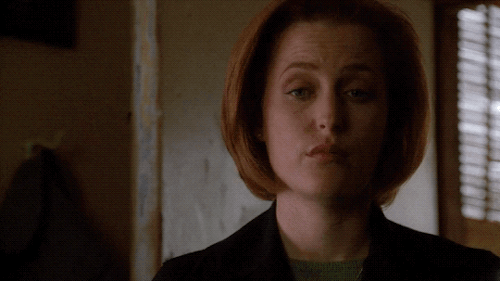
7) Allison Janney is someone who I love in literally everything I’ve seen her in. Even when she’s pretty much the straight man in this, the CIA director, I am just drawn to her. I just really fucking love Allison Janney.
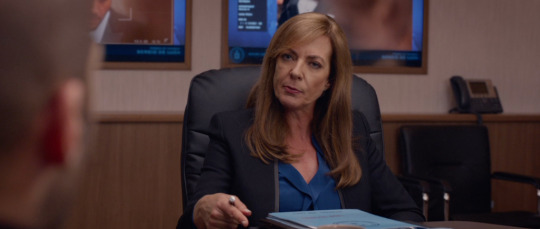
8) Jason Statham as Ford.

Holy fucking shit. Somehow Jason Statham is in a movie with modern day comedic legend Melissa McCarthy and ends up being the funniest person in the film. He is totally committed to Ford’s arrogance, jackass qualities, intensity, and hyper masculinity in a way which is 100% hysterical! It’s a tricky business because Ford doesn’t think he’s funny. Ford doesn’t think he’s weird or an idiot, and Statham plays it like that knowing it will derive the most laughs. Ford is basically the super testosterone filled action hero in every movie ever and Statham doubles that while stealing every single fucking scene he’s in. And his chemistry with McCarthy is off the charts funny! Melissa McCarthy is the bedrock this film rests upon but Jason Statham is the fucking cherry on top (I think I’m mixing my metaphors but whatever), he is absolutely amazing.
9) I love this because it makes me angry.
CIA Director Elaine Crocker [about why Fine pressured Susan to stay out of the field]: “Yeah, he sniped you.”

THIS IS REAL! THIS IS FUCKING REAL! MEN IN CHARGE KEEPING WOMEN DOWN BECAUSE THEY’RE WOMEN, WHETHER THEY KNOW THAT’S WHAT THEY’RE DOING OR NOT! GAH! I mean, the film including it is fucking awesome and handled really fucking well but holy shit it pisses me off that this is even a thing.
10) I find it endlessly frustrating (and I think I’m supposed to) that all of Susan’s aliases and spy gear are not the “sexy” stuff but things which could be considered “frumpy”. Why can’t she be a gorgeous baroness with a super slick ride and men on her shoulders? Have you seen Melissa McCarthy? She’s fucking gorgeous.
11) Melissa McCarthy has a very strong chemistry with Miranda Hart, who plays Susan’s best friend Chummy in the film. Their relationship in many ways is much more important than the ones Susan has with any other character in the film, including Fine. And you understand how good friends they are with each other as the movie continues. It’s really great.

12) Ugh.
Ford [after McCarthy points out he didn’t even like Fine]: “It’s called the rivalry of men!”
As a man I can say, “The rivalry of men,” is the equivalent of, “who’s dick is bigger,” because society has convinced us that we’re not a “real man” unless we’re the “biggest” man in the room. It’s fucking stupid.
13) One of the key things that makes Susan as strong a character as she is are her motivations. You understand what is driving her VERY clearly: her memory of Fine. It evolves into more than that as the film goes, it evolves into her just doing her job, but you understand why she does things which are outside of her norm. It’s because she is in pain over Fine’s (supposed) death and needs to make right by him. It’s clear and powerful and helps make the film as good as it is.
14) Aldo - as portrayed by Peter Serafinowicz (legendary character actor who can be found in Shaun of the Dead, Guardians of the Galaxy, the voice of Darth Maul in Star Wars: Episode I, and most recently “The Tick” on Amazon) is incredibly funny. Every overly sexualized moment with him & just his general chemistry with McCarthy makes him a worthy addition to the already stellar ensemble cast.

15) As I mentioned in note #10, I don’t understand why McCarthy is given all the frumpy gadgets and covers when she can pull this off:
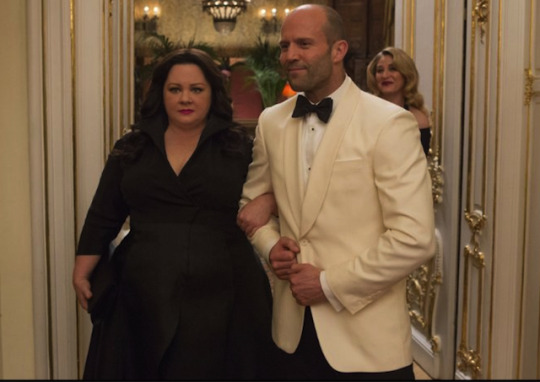
She’s fucking gorgeous.
16) I’ve mentioned this with a few pairings before, but McCarthy and Statham have this intense/incredible comedic chemistry which is born out of their strong bickering. This is most plainly seen when they're both at the hotel/casino arguing and I think the fact I’ve mentioned it so often is just a sign of how well put together this fucking cast is.
17) There is an incredible sense of tension that plays through most scenes (for example: when Chummy is trying to kill power to the casino) which ties into what I mentioned in note #3: it helps elevate the film over silly spy spoof into this engaging and riveting action comedy.
18) Rose Byrne as Rayna.

Rayna was apparently originally written as a 19 year old girl (this according to IMDb’s trivia section), which makes a LOT of sense considering how much of a BRAT she is. Don’t get me wrong, Byrne is absolutely excellent at giving of the appearance of this elegant and sophisticated socialite. But that’s where the humor is from. The juxtaposition between what you expect from her (a refined Bond villainess) and what she actually is: a moronic spoiled brat. Byrne plays the humor and juxtaposition perfectly. The key part is that - like Statham - she’s not actively going for laughs. She’s not hyping up the stupidity or the silliness, acting like Rayna knows she’s stupid, but instead trusting the script and playing it in a way where Rayna takes herself seriously. And THAT’S the gag! And it’s great!
19) At this point Rayna has called Susan a child multiple times, compared her to a depress homeless clown, and insulted her ability to address herself.
Susan [to Rayna]: “Why are you being so nice to me?”
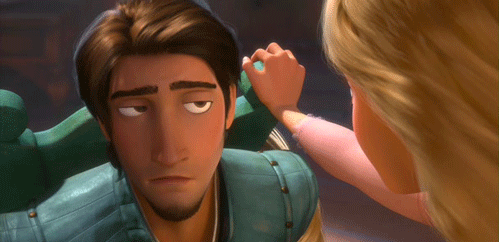
20) I’m starting to sound like a broken record but McCarthy’s ability to hold her own against how Byrne plays Rayna’s horridness is a testament to her talents as an actress and the chemistry between the pair. God, this movie is just so fucking funny.
21) I mentioned earlier that McCarthy gets the chance to play Susan as both more reserved and brash. It is when McCarthy is acting like “Amber Valentine” (the cover Susan uses to make Rayna trust her) that she gets to show off this aggression WONDERFULLY. It’s also wildly cathartic because a lot of people - including Rayna - have just been consistently putting Susan down for the ENTIRE film. Now she gets to go off on them and it’s amazing.

22) I’d like to point out that very few women die or get “fridged” in this film, not when compared to the men. I think during the entire movie only one woman dies but that’s a nice proportion swap to most male dominated action films. (How many women have died on Bond movies versus the men?)

(GIF source unknown [if this is your GIF please let me know].)
23) The Budapest car chase scene is one of the strongest action set pieces in the film. It’s filled with this intense and enjoyable action, sprinkled with just enough jokes to make it hysterical, it’s well choreographed, and just altogether a fun ride.

24) But even the Budapest car chase can’t compare with the kitchen fight.

The action is INCREDIBLY well done. The fight choreography and energy throughout is just truly kinetic and it just grabs your attention and NEVER lets go. It’s just insanely well done and by far the best scene of the film.
25) I would like to point out - similarly as I did in note #4 - that Fine is kind of a jerk to Susan. He attributes her continued success to Rayna’s inexperience just casually, like it’s no big deal, not realizing he just undermined all the amazing things she just did in this film. Meanwhile the creepy sexpot of Aldo supports Susan and reminds her she’s been doing an incredible job in this film.

26) When Susan learns that Fine is alive, her entire initial motivation for going the distance of being a spy is gone. But that doesn’t matter because she’s not doing this for any man anymore. She’s doing this because it’s the right thing to do and because she knows she CAN do it. I love that. And when Susan embraces this and kicks some serious ass, Fine sees her for who she is.
27) Wait…I just realized that Ford didn’t actually DO anything in this film. He just kept getting caught and screwing up.

I love that! It’s so much funnier for me that way! :D
28) I love that it’s Chummy who saves Susan in the end. Not Fine, not Ford, but her best gal pal. Friendship over romance/sexual attraction is something I really appreciate.
29) And by the time the film ends, all three of the main guys - Aldo, Fine, and Ford - want Susan now. But she doesn’t chose a guy, she choses Chummy. She choses a night out with her girls instead of even Fine, the guy she’s been pining over FOREVER. I love that.

Spy is an incredibly funny and heartfelt film with a powerful message about competence/self worth. Melissa McCarthy gives an absolutely stellar performance and is surrounded by a just as strong supporting cast, with Jason Statham being a particular stand out. The action is crazy, the humor is spot on, the characters are well developed, and the relationships are pure. All in all, it’s just a really freaking good movie I think everyone should see.
#Spy#Susan Cooper#Melissa McCarthy#Jason Statham#Rose Byrne#Jude Law#Paul Feig#Miranda Hart#Morena Baccarin#Allison Janney#Peter Serafinowicz#Epic Movie (Re)Watch#Take That Sexism#Movie#Film#GIF
341 notes
·
View notes
Text
I watched a couple of movies! (Part 2)
Back again with the second bunch of my latest quarantine companions! My last post wasn't that long ago, but I’ve already gone through an additional 21 and thanks to the extension of the lockdown and the abrupt cancellation of the rest of my sophomore year in college, I predict that this number will only increase exponentially. I obviously have to start looking for a sustainable way of reviewing the media I consume (probably will try dumping mini-reviews on Letterboxd instead), but until then, here is today’s little catalog: divided into four neat categories so there’s a little bit of everything for everyone.

Dead Poets Society (1989, dir. Peter Weir) ★★★★½
John Keating is the teacher we secretly deserved yet never had, which is probably what's behind the fervent loyalty audiences have had for this movie since its release around three decades ago. His methods of teaching are admittedly unorthodox, but they effectively instill in fictional students and real-life audiences the core message: to seize the day and be extraordinary. I definitely would have appreciated more of Williams, though: I noticed later on that he was used mostly as a plot device, as the focus started to shift to the impact his words had on the group of young boys under his tutelage. But, thankfully they are endearing and lovable in their own little ways (special mention goes to ambitious Neil, played by Robert Sean Leonard; and Ethan Hawke as timid Todd), which is why the last half-hour remains one of the heaviest in recent memory.
Mrs. Doubtfire (1993, dir. Chris Columbus) ★★★★
When Daniel Hillard’s (Robin Williams) wife splits up with him and takes their kids, he disguises himself as an English nanny called Mrs. Doubtfire and applies as their housekeeper to be with them. Not exactly the most realistic and practical approach to an issue as serious as divorce, but it succeeds by banking on heartfelt humor to strike a chord in products of broken families. When you take his several antics, punchlines, and vocal impersonations aside, he is simply a father willing to do anything for his children. Williams was destined to be the lead for this: his comedic timing, sheer versatility, and natural ability to bring joy remain unparalleled. Such a shame I didn't get to grow up with this guy, but maybe this saved me a lot of heartbreak.
Catch Me If You Can (2002, dir. Steven Spielberg) ★★★★★
A con man successfully cashes in millions of dollars worth of checks as a Pan Am pilot, doctor, and lawyer, whilst evading the FBI agent who’s hot on his heels. And this is all before he turns 19 years old--what a total underachiever. The best part? It’s a true story. I find it hard to believe that this clever cat-and-mouse story lasted more than two hours: it's easy to lose track of time thanks to its dynamic and snappy screenplay, coupled with the chemistry of its brilliant lead actors (no less than Leonardo DiCaprio and Tom Hanks). But beneath the complex and technical aspects of his scams that have high entertainment and educational value lie touching moments that may be admittedly easy to miss. At the end of the day, these escapades were nothing but some twisted coping mechanism of Frank Abagnale, Jr.’s to deal with the divorce of his parents. *blows nose into handkerchief* Wow, I seriously didn't think something could be so fast and fun, yet so depressing either!
Good Will Hunting (1997, dir. Gus Van Sant) ★★★★★
Academy Award-winning writers Matt Damon and Ben Affleck may look like they share a solitary brain cell in total (a prime example would be this footage of their acceptance speech), but it was the power that radiated from that which brought us this instant favorite of mine. This engrossing story revolves around a janitor at MIT, with a genius-level IQ but a troubled and traumatic past. A scuffle with a police officer leads him to Sean, his therapist (and platonic soulmate) who breaks down his dangerous defense mechanisms and self-destructive patterns, helps him tackle his inner demons, and ultimately transforms his life. There is a lot to adore about this film that’s equal parts wit and heart, but my favorite has to be the razor-sharp and realistic dialogue between Damon and Williams. Smoothly transitioning from topic to topic—genuine friendship, abusive relationships, and everything in between—it gives us the opportunity to monitor Will’s growth while carefully examining these aspects of our own lives. With every word said, the audience is reminded once again of any person's innate capacity to change for the better as long as someone else believes in them.
Lost in Translation (2003, dir. Sofia Coppola) ★★★
Film Twitter and the Letterboxd community both made this out to be an outstanding piece of modern cinema, so I went in with very high expectations only to be sorely disappointed and unable to understand the hype behind it. This revolves around two lonely people who find solace in each other and the unfamiliar and unpredictable territory they're in, a storyline brimming with potential that just fell flat to me. I normally appreciate the beauty in silent and ambient scenes, but the ones that made up a huge bulk of this feature didn’t have substance—it was similar to watching mashed-up clips from some random travel vlog. I did find the choice of location fitting though, I am now a hundred percent convinced I should travel to Japan once this pandemic is over. And Scarlett Johansson is incredibly talented for her age: her ability to channel and characterize emotions that a 17-year-old may not even be able to comprehend is above par, which is the main reason why this gets a passing rating from me.
Forrest Gump (1994, dir. Robert Zemeckis) ★★★★★
What I would give to run into a chocolate-eating, Nike Cortez-wearing Forrest Gump at a bus stop, and hear him tell me these fantastic stories himself! This heartwarming tale shows the manner in which he weaved himself into significant historical narratives (literally and figuratively, thanks to the power of deepfake) and injects timeless lessons along the way. Tom Hanks is undoubtedly brilliant as the titular role, and as we see the world according to this feeble-minded and well-meaning man, we come to admire his values, appreciate his efforts, and forgive his occasional shortcomings. In this fast-paced and overly complicated world that we struggle to navigate, this can serve as a necessary breather, a reminder of the simple joys that the world has to offer.
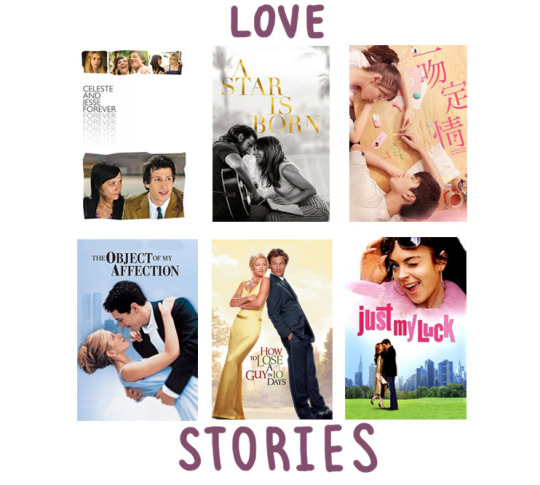
Celeste and Jesse Forever (2012, dir. Lee Toland Krieger) ★★★★
I think this is the first time I’ve witnessed a breakup end rather amicably on the big screen: there's no screamfest that concludes with a cold slap to the face and a dramatic walkout, or a courtroom confrontation that unearths past transgressions, et cetera. Instead, the leads are forced to confront the fact that the friendship they have forged years before that eventually blossomed into something more will never be the same again. Even if they want to so, so bad. I guess that’s why this is so heartbreaking, and thus the perfect companion for any person in the process of finding themselves after the demise of a long-term relationship. Celeste (Rashida Jones) meanders through the process with an extreme lack of finesse—which is the most realistic way to do so—that heavily accentuates her several fatal flaws. But, she manages to finish strong, emerging as a self-reflective and action-driven version of who she was in the beginning. I definitely wanted additional exposure for Jesse (Andy Samberg), though, who was not only surprisingly tender and sensitive in contrast to the Jake Peralta we know and love (and want to pick on), but also an unexpected perfect onscreen match for Jones.
A Star is Born (2018, dir. Bradley Cooper) ★★★★
The third remake of the 1937 movie starring Janet Gaynor and Fredric March, this edition of A Star is Born strays far from the paths traversed by its predecessors (and this I am aware of, from that film analysis video binge I did recently). It’s the first to give Jackson Maine (Bradley Cooper), the has-been with a raging alcohol and drug problem, extensive back story that draws audiences closer to him. But, this character arc comes at the expense of Ally's, the talented singer that he propels to fame, played by Lady Gaga. It was a shame she wasn’t fleshed out as much as she should have been, given that Gaga was a natural, her vulnerability a far cry from her outrageous onstage persona. But, then again, expectations must be kept realistic: it would’ve been impossible to cram that into the specified duration. Nevertheless, I thoroughly appreciated it: though rehashed several times, a romance done this way keeps its key components while catering to the preferences of this generation. The soundtrack is outstanding, and the climax—though somewhat expected—finds new ways to reduce us to a puddle of tears, particularly as the last song number start to roll.
Fall in Love At First Kiss (2019, dir. Frankie Chen) ★★½
Our Times has been a favorite of mine for years, so I couldn't believe that I missed this work from the same director which starred the same male lead during its initial release. Turns out it didn’t make much of a difference whether I watched it or not. The storyline was silly, but forgivably so: in a school where students are segregated based on intelligence, a stupid girl is smitten by the smartest boy in school and gets rejected as soon as she confesses. Consequently, hell breaks loose after they are forced to live together for reasons you have to see to believe. I remember enjoying the first half, squirming in my seat because of Jiang Zhishu (Darren Wang) every chance I'd get. I can’t pinpoint where exactly it started going wrong, but I remember realizing that it is possible for something to drag along, yet also move so fast: to bore me with excessive detail in a single scene, then cut to the next so fast it loses a sense of continuity. In addition to that, the female lead (Jelly Lin) was so unbearable in terms of her acting style and character development (or lack thereof). She seemed to think that constantly complaining in her shrill voice and thrashing her limbs was a fitting substitute for dialogue, thus making it difficult to want her to get her happily ever after. Also, I’ve had pretty intense crushes in the past few years but what she has for Zhishu is bordering more on an unhealthy obsession—I have trouble believing he reacted so calmly to the shrine that she built for him (which included life-size pillows with his face on it).
The Object of My Affection (1998, dir. Nicolas Hytner) ★★½
I was very confused as to why I had never heard of a chick flick that starred two of my favorite actors from the 90s, but now I understand why it didn't take off. (Phoebe would probably share my sentiments. What's her best friend doing with her husband anyway? And why is he attracted to men?) Nina (Jennifer Aniston) is hopelessly in love with her gay best friend George (Paul Rudd), so much so that she decides she wants to raise her unborn child with him instead of with her overbearing and borderline manipulative boyfriend (John Pankow). Though it wasn't a complete disaster given that she didn't successfully convert him, Nina was far too demanding, constantly overstepping her boundaries, and feeding her delusions. Maybe it could afford a modern retelling since I know our generation could tackle the concepts of platonic soulmates and LGBTQ+ relationships in a way that is simultaneously vibrant and sensitive.
How to Lose A Guy in 10 Days (2003, dir. Donald Petrie) ★★★★★
Once I had tried my luck in a number of different genres, I decided to reward myself with a return to the cheesy, corny, and conventional chick flicks I am familiar with—and I’m glad that I picked this one! Andie Anderson (Kate Hudson) is a magazine columnist with her biggest scoop yet: an article on how to lose a guy in 10 days. To test this idea out, she tries it out on Ben Barry (Matthew McConaughey), who’s on a mission to make a girl fall for him within that duration as well. Their conflicting agendas lead to disastrously hilarious results as they realize that they’re both *gasp* catching feelings for each other! I enjoyed this very much despite the predictability, although I’m honestly unable to judge it based on any criteria other than what I felt which was pure and utter, slamming-the-table, throwing-my-stuffed-toy-across-the-room “kilig”.
Just My Luck (2006, dir. Donald Petrie) ★½
I didn’t expect this to be on the forgettable side of the romcom spectrum, when it had Chris Pine as the leading man and Brit-pop band McFly lending their music to most of the scenes (the sole redeeming factor I found). But, I guess it’s Lindsay Lohan’s character and her surprising lack of chemistry with the equally attractive and talented person opposite her that killed it for me. Here, she plays Ashley, the luckiest girl in the world who gets everything her way and is thus as snobbish and stuck-up as you’d expect her to be. A chance encounter brings her to Jake, who is the human equivalent of a black cat standing in front of a broken mirror, and swaps their fate. She is then left to deal with poorly contrived misfortunes with effects that are bordering on slapstick comedy: she gets doused in mud, mildly electrocuted, and soaked in bubbles shortly after blowing up a washing machine and I get that they’re probably supposed to be funny, but all I’m seeing is a live-action version of the Looney Tunes show.
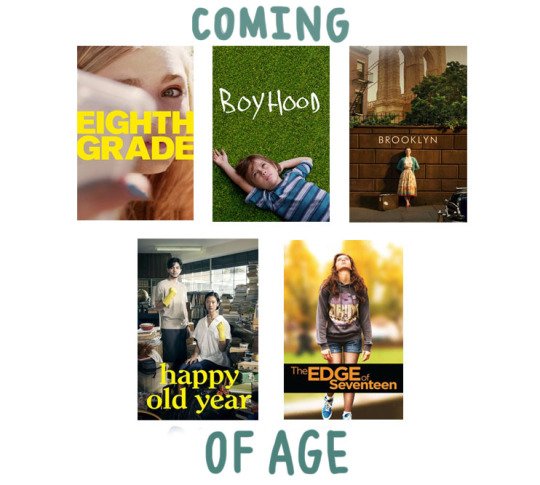
Eighth Grade (2018, dir. Bo Burnham) ★★★★★
Entering our awkward preteen years has always come with a certain and specific kind of mortification, but I reckon it’s become increasingly difficult in the age of the Internet. It’s become easier to find fault in oneself for the pettiest of reasons: why isn’t my crush accepting my friend request? Why do I look like a monster in my #wokeuplikethis selfies? Why is no one viewing my YouTube videos even if I work hard on them? Eighth Grade encapsulates this difficult period in the lives of Gen Z kids with the use of experiences and references which are so specific to this generation: I may have gotten whiplash more times than I would care to admit. Elsie Fisher shines in her painfully relatable performance as Kayla: you can sense her desperation for social acceptance. She just wants to be worth noticing and remembering, is that so bad! Although his role is often overshadowed, I also felt for her dad (Josh Hamilton), who tries to hide the struggle of looking out for a daughter who's growing in ways he simply can't understand.
Boyhood (2014, dir. Richard Linklater) ★★★
This ambitious effort by the director of my favorite film trilogy observes the growth and development of a typical American boy named Mason. No fancy plot devices or major conflicts are in sight, but by using the keeping the cast members fixed during the 12 years it took to put this project together instead of swapping them out for older counterparts, audiences are expected to form an emotional connection with them because they were given an intimate and prolonged look into their lives. Unfortunately, this wasn’t the case for me. Yes, I did watch him grow up before my eyes, but I barely know who he is. These mundane snippets of his life haphazardly stitched together, without any indication of how much time has elapsed since the previous scene, made it hard to keep up with the pace and look at the viewing experience as anything but a chore. I honestly am puzzled as to why I endured 165 minutes (I’m kidding, it was for Ethan Hawke) worth of footage, and sadly it wasn’t even worth it.
Brooklyn (2015, dir. John Crowley) ★★★★
This drama about the migration of an Irish girl to New York to seek better opportunities delves into the concept of what home truly is, as Eilis is left to choose between two men from two different countries. Divided into three segments revolving around pivotal events in the protagonist’s life, it sensitively tackles the experiences and issues familiar to any immigrant, remains true to the period it is set in, and engaging to audience members of all ages. Most in the historical genre are incapable of doing all three, so that's definitely no mean feat! And I’m not biased because Saoirse Ronan plays the starring role, although her compelling performance renders it impossible for anyone who claims to have a beating heart to finish this without puffy eyes and a heavy chest.
Happy Old Year (2019, dir. Nawapol Thamrongrattanarit) ★★★★
I thought Chutimon Chuengcharoensukying couldn’t top her role in Bad Genius, but she just had to come along and star in this personal take on new beginnings. Here, she plays Jean, a girl in the process of decluttering her house so she can transform it into an office space. While sifting through her possessions, she finds certain things belonging to people from her past, that remind her of broken relationships and question her philosophies on forgiveness and letting go. Her performance may be understated compared to the cunning and reckless Lynn she has become popular for, but I see this mastery of restraint as indication of her growth as an actress. The film is relatively simple in its execution, staying true to its central theme of minimalism. By stripping the structure down to the bare essentials of actor and dialogue, the audience can focus on the poignancy ingrained in the most mundane part of our everyday routines.
The Edge of Seventeen (2016, dir. Kelly Fremon Craig) ★★★★
It's actually true that a coming-of-age movie has been written based on every definitive moment a teenage girl experiences, they weren’t lying. The Edge of Seventeen could serve as part of Eighth Grade's cinematic universe, but instead we’re dealing with another reflection of who we were (or maybe still are). Nadine (Hailee Steinfeld) is a teen constantly teetering between arrogant self-assurance and sheer hopelessness. When she loses her best friend to her worst nemesis, she suddenly has to learn to navigate the ups and downs of adolescence and deal with her mental illness on her own. Besides focusing on the several firsts that we often encounter during this stage in our lives, the film accurately portrays our angsty and self-deprecating nature without resorting to mockery, therefore calling us out on this reflex we have of beating ourselves up and giving those around us permission to do so during such a critical part of our lives. I swore I was actually going to try not to cry here, but I guess Nadine's tearful monologue left me with no choice. (I'll leave it below so you can suffer with me.)
You know, ever since we were little, I would get this feeling like, like I’m floating outside of my body, looking down at myself… and I hate what I see: how I’m acting, the way I sound, and I don’t know how to change it. And I’m so scared that the feeling is never gonna go away.
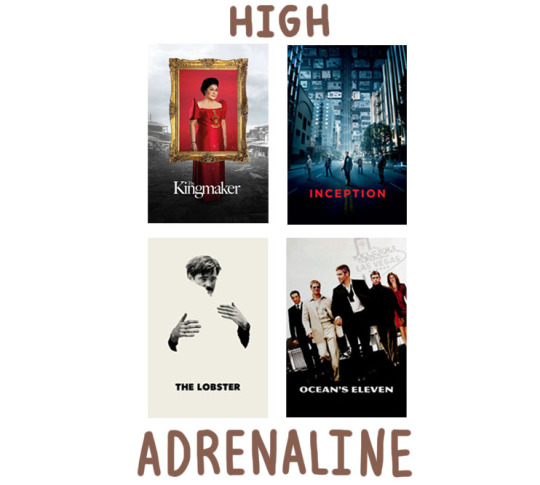
The Kingmaker (2019, dir. Lauren Greenfield) ★★★★
This documentary is a fitting introduction for anyone who isn't familiar with the ill-gotten wealth and abuses the Marcoses have lying underneath their glossy veneer of opulence as well as the consequences of their actions that we suffer from to this day. Greenfield’s juxtaposition of this family’s fabricated stories and the testimonies of victims and first-hand witnesses was a smart move, as we observe the lengths they often go to, to revise the course of history. By spotting the parallels in their narrative and that of Rodrigo Duterte, the next strongman the voting population would unfortunately elect as their leader, we are also given a glimpse into the selective amnesia of the Filipino people that keeps these people in power. The danger lies in the fact that being an outsider herself, Greenfield leaves plenty of room for interpretation: there is no clear-cut statement of what was right and wrong among the several interweaving statements we heard. I was able to determine which was which is due to the fact that I already had prior knowledge, but where does that leave those who don't?
By the way, if you’re wondering why this has been grouped under this category, it’s because I remembered from Grade 6 science class that anger is one way to trigger adrenaline in the body.
Inception (2010, dir. Christopher Nolan) ★★★★★
Perfect always felt like a lazy way to describe what is supposed to be of superior quality. If you want to sing praises about anything that good, you're gonna have to do a better job than that to convince anyone that it's worth their time: was it inventive and bold or cerebral or emotional? Well, I'm afraid I have to bend this rule for Inception for the sake of brevity, because if I leave myself to ramble on about everything this did right, I would surely run out of adjectives. This sci-fi-heist-psychological thriller is in a league of its own, with its intricate plot and layered method of storytelling further amplified by stellar cast performances, masterful editing and special effects, and a thundering musical score that keeps audiences on edge for the entirety of its run. These elements come together to create a production that resonates and lingers with viewers long after the credits have rolled, partly thanks to that highly disputed final scene. (If my opinion is worth anything here, I believed that it stopped. Iykyk.)
The Lobster (2015, dir. Yorgos Lanthimos) ★★★★½
In this dystopian society, single people are required to check into a hotel in the hopes of finding a suitable partner within 45 days. If they fail to do so, they are sentenced to live the rest of their lives as an animal of their choice. It’s an absurd plot, far removed from reality, executed in a bleak and dry fashion. Yet, it manages to mirror and even satirize the world of modern relationships rather profoundly, particularly the societal pressure to couple up and find our ideal match instantly, or face harsh judgment. I doubt I've watched anything this dark in my life, but I found the unpredictable twists and turns, the deadpan humor, the sheer strangeness of it all very amusing and recommend it to anybody who wants to learn a thing or two about how blind love can be.
Ocean’s Eleven (2001, dir. Steven Soderbergh) ★★★★
I admit I was as pissed as Rusty Ryan (Brad Pitt) following his discovery that the reason why Danny Ocean (George Clooney) was keen on carrying out an elaborate heist of the three biggest casinos in Las Vegas was to win his wife (Julia Roberts) back. But, along the way, I was reeled in by the airtight pacing of the multiple scams that were a part of the scheme and the natural banter that takes place among the members of the ensemble. Also, it’s quite impossible to be annoyed at something that starred so many big names during the peak of their careers. (I have a soft spot for Matt Damon, thanks a lot Good Will Hunting.) Although I already knew what was going to happen, it was a joyride to see everything unfold. Based on the ending (and the copies of Ocean’s Twelve and Thirteen that my dad owned as a kid), I can tell that it’s far from over and I’m surely looking forward to what happens next.
So, that’s it for today’s round-up! Hope something caught your interest: I’d be happy to send 123m*vies links for any of those that aren’t available on Netflix. Feel free to hit me up too: I'm honestly up for thought-provoking discussions and straight-up keyboard smashing. Wishing you love and light always, and don’t forget to wash your hands, check your privilege and pray for our frontliners!
#recs#angeltriestoblog#life dump#movies#movies to watch during quarantine#my eyes are irreparably strained#quarantingz
0 notes
Text
The Best Films of 2018, Part IV
Scroll down for Parts I, II, and III.
VERY GOOD MOVIES THAT STILL AREN’T TECHNICALLY GREAT--SEE, I LIED, NEW CATEGORY, WHICH REALLY SAYS SOMETHING ABOUT THIS TIER IN 2018 AND MAYBE HINTS THAT THERE WEREN’T MANY MOVIES THAT I GENUINELY LOVED
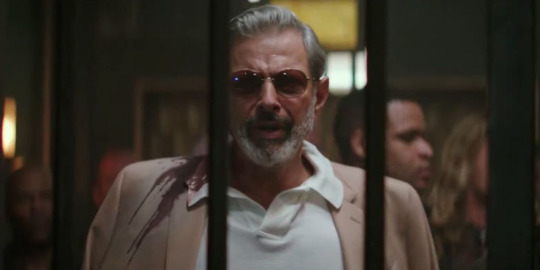
44. Hotel Artemis (Drew Pearce)- It should be illegal to watch this movie before midnight because it is an exploitation flick to its core. Is it a problem that it's shaped like a triangle, that it starts wrapping up its answers the minute we understand what the questions were? Yes. Is that a problem that Jeff Goldblum, playing the Wolf King, wearing a double-breasted camel's hair coat like a shawl, can't fix? No.
43. Sicario: Day of the Soldado (Stefano Sollima)- Considering how much I liked Sicario, I'm impressed by how close its sequel came to its chilly hardness. Strangely enough, the craft suffers more from the absence of Jóhann Jóhannsson than it does from the absence of Denis Villeneuve. Aside from a lull at the two-thirds mark and the pulling of exactly one punch, this entry feels as vital and astute as the last one.
Which means the real auteur must be Taylor Sheridan. His script mimics the structure of the original while twisting its characters just askew enough to breathe new life into the material. His screenplays just sort of unfold in a way that I find organic--it's hard to even say what the conflict is until halfway through most of the time. And if he wants to write five more of these, I'll gladly take them.
42. The Other Side of the Wind (Orson Welles)- Like almost anyone else, I'm grateful that The Other Side of the Wind exists at all. The fact that it's so more personal and experimental than I expected is a bonus. It's kind of a mess until it congeals at the drive-in, but every choice still seems labored over. (The claustrophobic nature of the party versus the wide open spaces of the film-within-the-film, for example.) Nonetheless, it's hard to go to bat for a movie whose backstory is more captivating than the final product.
41. The Mule (Clint Eastwood)- Besides the breezy glide of the pacing, the performances stand out. Eastwood's is the type that we haven't seen from him in a while. He smiles a lot. He sings and dances and flirts. He's generally carefree and loopy. And he's contrasted with* a nervy Bradley Cooper in one of those humongous-star-taking-the-back-seat performances, sprinkling charisma the way Sean Connery did in The Untouchables.
But there is no elegance at all. Besides Chekhov's cough and the cheesy elbowing of "If only somebody had $25,000 to save the VFW Hall," we get the messy racial politics of Eastwood once again. Whereas Gran Torino worked for me because it's aware of its own racism, this one thinks that it's doing some good. The subtext is that an old White man would never catch trouble from police, but the text is a Hispanic man getting pulled over and nearly pissing himself for laughs. Hard to argue this isn't a fun time at the movies though, despite the fact that it's almost entirely about regret.
40. If Beale Street Could Talk (Barry Jenkins)- Too theatrical and outre for my taste, but it's easy to get lost in its cosmetic pleasures: the lush colors, the lavish costumes, the immaculate close-ups, the best score of the year. I liked it, especially the Brian Tyree Henry tangent, but as the movie is swooning over itself, it's easy to catch yourself thinking, "What is this even about?"
39. Can You Ever Forgive Me? (Marielle Heller)- Can You Ever Forgive Me? hits every beat you would expect from an "in over her head" crime movie, but the time that the film dedicates to the central relationship creates a rare intimacy. If you stopwatched it, I imagine the majority of the film would be McCarthy and Grant talking to each other. That focus, along with a resistance to smoothing over the characters' rougher edges, elevates a kind of boilerplate story.
38. Blockers (Kay Cannon)- Even if the ending is kind of exhausting, desperate to give each character his or her moment, this is hilarious. Not so much in the setpieces showcased in the commercials but frequently in an expression or line reading. The Blu-Ray has a line-o-rama gag reel that is funnier than some entire movies. It's pretty progressive and fair in its portrayal of young female sexuality too.
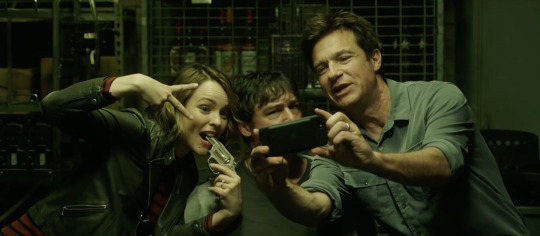
37. Game Night (John Francis Daley and Jonathan Goldstein)- It gets a little tidy and full circle for my taste, but this movie has some great laughs while being a good example of a film that nails both the characters' "want" and the characters' "need." Rachel McAdams is winning, and Jesse Plemons steals all of his scenes.
Game Night also has way more of a filmic identity than one might expect, since it doubles as a sort of Fincher parody. Besides Cliff Martinez's insistent electronic score and some CGI-for-no-reason establishing shots, Daley and Goldstein borrow the auteur's desaturated palette, locked-down camera, and narrow light range. There's even an elaborate one-r. The visuals elevated a premise that had the potential to be really dopey.
36. First Man (Damien Chazzelle)- I think this is exactly the movie Chazelle wanted to make, but, to match my expectations or his filmography, it's not quite good enough. Cool to the touch, though anything else would be antithetical to who Armstrong was. In the shape of suspense, but with an outcome that is obviously never in doubt. Flipping to the IMAX ratio the second the crew docks onto the moon is a cool trick, but it's as innovative as things get.
The cast is game. Gosling's fastidious brooding resists any of his Movie Star charm but still holds every scene, and the framing of Armstrong's motivation works very well. Foy's reading of "a bunch of boys" is about to become a t-shirt. Kyle Chandler and Jason Clarke and the suddenly mature Patrick Fugit all get their moments. The final scene places the film into the Chazelle tradition of people whose calling is greater than even their most transcendent relationships, and a protest sequence is a welcome break from the eraser-streaked perfectionism.
I'm sorry that I wanted Apollo 13 instead of a hipper Apollo 13.
35. Spider-Man: Into the Spider-Verse (Bob Perischetti, Peter Ramsey, Rodney Rothman)- Within the course of one year, we got two possible solutions for the "problem" of inspiring but self-serious origin stories. At the beginning of the year, Black Panther mastered the form and presented it so solidly that it couldn't be argued against. Spider-Man: Into the Spider-Verse goes the other way, so impressionistic that the final sequence is people flying through abstract shapes and colors, so irreverent that a character cuts someone off mid-sentence as he says, "With great power comes..." Though I would have trouble explaining the film, all of the dimensional comings-and-goings make sense in the moment, and it's easily the funniest Marvel movie ever made.
Maybe purposefully, it is overstuffed though. Six different iterations of Spider-Man is enough to juggle; I definitely didn't need a cadre of villains that was even less defined. I have to admit, even though I couldn't tell you what to cut, I was exhausted by the end, even if I was huffing and puffing fresh air.
34. Boy Erased (Joel Edgerton)- Many characters do bad things in this movie, but they're people trying to help and doing their best, justifying the pain that they're causing. This is a film that easily could have been drawn in caricature, and it never is. It does, however, draw the characters as fairly as they deserve, so the Joel Edgerton gay conversion therapist does wear bad ties and pronounce some words incorrectly. The Russell Crowe character, especially in the powerhouse final scene, is more complex and real, at least if I'm to judge by my own father, who has disturbingly similar moral authority and power moves k thx bai.
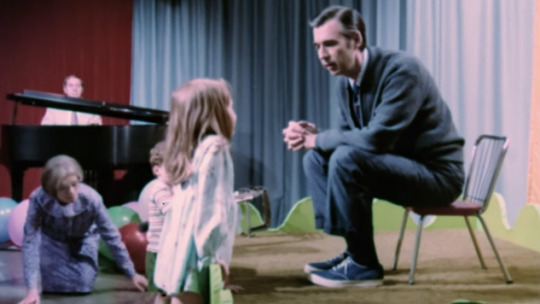
33. Won’t You Be My Neighbor? (Morgan Neville)- This one is more cohesive than 30 Feet From Stardom, but these Morgan Neville docs are sometimes too slick for their own good. If you've never made the "jerking-off motion" with your hand, then you'll be tested when he asks his subjects to close their eyes and imagine someone special to them.
That's not to say that the nearly pornographic reverence of Fred Rogers is not deserved or effective. And one of the most daring notes of the film is the suggestion that, in our hostile times, Rogers's message might not have stuck. The jabs at Trump aren't overplayed, but the president is sort of a pall over the entire film. When Rogers says, "The most essential things in life are invisible," it's hard not to imagine the person on our TV daily who is the antithesis of that idea.
32. Hearts Beat Loud (Brett Haley)- This is a heartwarming movie that ends on a high note with solid music. (Important because, if the music that the father and daughter made had been bad, the whole thing would have fallen apart.) Occasionally, it falls into that ensemble problem of "Good news: We got Ted Danson. Bad news: We have to find something for him to do." And it's a weird sideways ad for Spotify. But if I gave Begin Again three stars, then I have to kick this Once-core entry up to three-and-a-half.
If I may, though, I would like to analyze a recommendation that Offerman's record store owner makes to Collette's character. Since she's buying Dig Me Out by Sleater-Kinney, he puts her on to Animal Collective's Merriweather Post Pavilion, an album she has not heard of. Which is absurd. Forget that Animal Collective should not be recommended to any woman ever. Any person who knows Sleater-Kinney also knows Animal Collective. She would have heard of them if only because they would be a bad match for someone who likes Sleater-Kinney. But here he is all like, "Check out 'My Girls'--killer song." You're going to recommend the lead single, fam? You're not even going to go out on a limb and push "Bluish"? No wonder your store is shutting down if you're pushing free folk/art-punk onto riot grrls.
31. Western (Valesta Grisebach)- While I was watching Western, I can't say I was having too much fun. It seemed like an adequate story told in a patient, austere way. But in the days since then, I haven't been able to get it out of my head. The way that Grisebach gets so much out of non-professional actors, the way that each character seems to exist not so much as a person but as a totem for something like aggression or labor or exploitation or occupation. Like few other movies--though Beau Travail comes to mind--it's a portrait of masculinity that seems really resigned about its conclusions.
30. American Animals (Bart Layton)- I worry about the potential Boondock Saints effect of this movie: Do I want to be in the same number as the college dorm crew attracted to it only for its style? Is it only style? I don't think it adds up to much ultimately.
But it does have style, and it's way too fun of a caper flick to resist. It presents an interesting bridge in Bart Layton's career, from non-fiction that is a bit too fictional to fiction that is a bit too factual. The segments with the real people involved in the heist serve as decisive punctuation to the florid sentences of the narrative. I also appreciated that the film didn't dwell too much on the trial, since we know exactly where the boys faltered and what evidence did them in.
29. The Land of Steady Habits (Nicole Holofcener)- I loved the rich characterization of the first half, which resists hand-holding as it plops the viewer into a post-divorce setting that is familiar but specific. The film bounces off into tangents from there, some of which are great, but Edie Falco seems to draw the short straw. There are three actors on the poster--weird-voiced Ben Mendelsohn, Thomas Mann, and Falco--but her character is left undeveloped, a bit unfairly, as the proceedings favor the men. The film is still another ground-rule double for Holofcener, a filmmaker who gives the impression that she has no idea what a ground-rule double is.

28. Private Life (Tamara Jenkins)- I don't know anything about Tamara Jenkins's personal life, but there's no way that the details and emotion of the central couple's infertility don't come from her own pain. That frustration and obsession take center stage, and we get filled in with the rest of the details patiently as the film goes on. I don't think we even know what Giamatti's character does for a living until forty-five minutes in, and that's okay. The movie cares more about the supporting characters than I did, but I appreciated the lived-in realism of an apartment with books filling up the fireplace.
27. Flower (Max Winkler)- Although I didn't believe Zoey Deutch as a seventeen-year-old, I was impressed by this script, which moves slowly until it doesn't. I guess "Flower" is good branding since there doesn't appear to be a movie called that already, but I kind of wish this had just been called "Erica." It builds that character carefully, plants her in an impossible situation, then unleashes hell upon her.
An advantage of a movie with teenage characters is that they don't necessarily have to make the most logical decision in a given moment, so even when these characters are being dumb, they're being true to themselves. As the most prominent Zoey Deutch stockholder in North America, I actually thought about bumping this up an extra half-star.
26. Leave No Trace (Debra Granik)- Leave No Trace is partly about how existing outside of society can be as much of a contrivance as buying in, but the way the movie delivers that message is less ham-fisted than my description due to the intense performances at the center. Ben Foster, uncharacteristically restrained here, reportedly worked with Debra Granik to excise 40% of his dialogue, and that choice speaks volumes about the trust the film has for the audience in limiting the exposition.
The only thing holding me back was how exclusively internal the father-daughter story is. Unlike Granik's Winter's Bone, which functions as both a (similarly compassionate) coming-of-age story and a race-against-the-clock thriller, Leave No Trace is tracking only emotional growth. Will and Tom aren't headed anywhere in particular, which is part of the survival-versus-living point. But, you know, get you a Debra Granik movie that can do both.
25. Eighth Grade (Bo Burnham)- Socially terrifying when it isn't being effortlessly funny. Sometimes the protagonist is downright frustrating, which the film doesn't shy away from, but the vulnerability of Elsie Fisher's performance grounds everything around it. Besides nailing adult condescension, Burnham's script works because the big social disaster is always averted until it suddenly isn't, and that's when the moment hits the hardest. Somewhere in the back of my mind though, I kept thinking that perceptive realism is easy to do if that's your only goal. To quote the kids: "Some shade."
I spent most of the movie thanking God that YouTube channels didn't exist when I was thirteen.
24. Three Identical Strangers (Tim Wardle)- I'll be the millionth person to write "truth is stranger than fiction" with regard to this movie. And sometimes having no idea where a movie will go is enough.
23. Green Book (Peter Farrelly)- When a dramatic director makes a comedy, it often feels self-conscious and overt. I'm thinking about Von Trier's The Boss of It All, in which the technique is more important than any audience joy or release. Or Michael Haneke explaining tirelessly why he thinks Happy End is "actually a comedy." Unsurprisingly, the results work a lot better when a comedy director of twenty years decides to go more serious. He knows what audiences want, he already understands how to wring tension out of each scene, and all he needs is the right subject.
The last item is where Green Book suffers. In the end, this is still a movie in which a White guy learns not to be racist. The first third, there seemingly to insist that Tony is the main character, is shaggy. I would wager the men don't get into the car inside of forty minutes. But once we're on the tour? Man, is this a crowd pleaser. The men's respect for each other grows gracefully, and the film's proud sentimentality powers its best moments as they fly by at a clipped pace. I had given up on Farrelly after Hall Pass, which felt amateurish, so a work of such professionally manicured (manufactured?) emotion was a shock.
On a different note, are any of you interested in a thousand words on Linda Cardellini's posture?
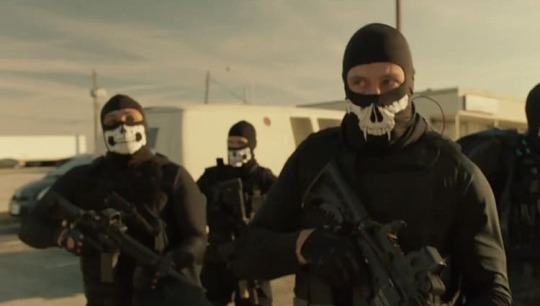
22. Den of Thieves (Christian Gudegast)- Despite the February release date, a director with no track record, and the most #basic studio lead there is, Den of Thieves is a caper film as sprawling as it is humane. Even Potato-face Butler is perfect for his role.
I watched the unrated version, which should be called the "depressing version," since I know exactly what was cut. (Hint: The wordless scene of Butler's jilted family ignoring him when he sees them in the grocery store, not anything from the shoot-out.) There's a spot where I would end the movie, and it's way before the Keyser Soze epilogue, but this was a welcome surprise for me. The movie seems to find its star in O'Shea Jackson, Jr. as it goes, and I completely agree. Many more like this please.
21. The Front Runner (Jason Reitman)- Reitman starts with a complicated oner that cranes up and down, zooms in and out of new characters, and times itself perfectly to catch snatches of conversations about "how can you even lay this much cable?" And in all of its Altman-esque indulgence, it's kind of the movie in a nutshell. Something simple--a scene shot with one take--commenting on how damned hard it is. What seems like a straightforward thesis moves at a breakneck pace with a game ensemble until you realize that it was all more complicated than it seemed.
Hugh Jackman has the challenge of playing someone essentially unknowable, but he has an amazing moment in the first third. On the chartered boat called Monkey Business--such a bad look, dude--Gary Hart is composed and dignified until a woman we don't see* sits down across from him, and his whole affect changes. His guard drops, and he seems absorbed by her, giggly. We can't hear what he's saying, but he's asking her about herself and joking about himself. Both or one or neither of those personalities is the real guy. The Front Runner is a movie about a tragic Great Man, and they're always described as if they can't help themselves, as if they're fighting their demons until the magic moment when they aren't. Jackman made that magic real for me when Hart's personality fell out.
20. The Ballad of Buster Scruggs (Joel Coen and Ethan Coen)- Patently uneven and bizarrely sequenced, The Ballad of Buster Scruggs doesn't stack up to the Coens' major works--though it demands another viewing. I did think, in all of its bleak absurdism, that it belongs in their neighborhood.
To me, there's a dichotomy that most of the brothers' films trace. We're all doomed, but the force that does us in is sometimes fate (A Serious Man, Inside Llewyn Davis, The Hudsucker Proxy, No Country for Old Men) and sometimes the stupidity of other people (The Big Lebowski, Blood Simple, Burn After Reading, Miller's Crossing). This new movie seems to start with the latter, waver sometimes in the more interesting middle stories when Zoe Kazan and Tom Waits break my heart, then end up at the former. Tracking such a thing in miniature can be really instructive.
19. The Tale (Jennifer Fox)- If you can look past Common's goofy voice and the more afterschool special aspects of this movie, then you can realize that it should actually, as disturbing as it is, be an afterschool special. It spins its wheels sometimes, but the questions that this movie asks about memory and abuse are invaluable. Presenting a downright shocking portrayal of grooming and secrecy, it avoids easy answers and over-sympathizing with the protagonist all the way through. (Especially notable because the character is "Jennifer Fox," and the director is Jennifer Fox.)
Laura Dern remains Laura Dern, but I loved Jason Ritter in this. Exactly because he has been in a hundred failed sitcoms, he is terrifying here as a devilish knock-off of the type of guy approachable enough to be on TV.
18. Paddington 2 (Paul King)- At first, during the extended introduction, I was worried that Paddington 2 was falling prey to the curse of the sequel: more, not better. But as each family member pays off what we learned about him or her in the introduction during a sprightly train setpiece that owes more than a little to Keaton, I realized that I shouldn't have doubted the Paddington empathy machine. This one carries over the humor and sweetness but goes even harder on the pathos in its attempt to convince us to have good manners and care about the people around us. I'm not sure any other movie this year hit me harder than when the Browns don't show up for their weekly meeting at the jail.
Hugh Grant, an actor who always seems to be having fun, has never seemed as if he is having more fun.
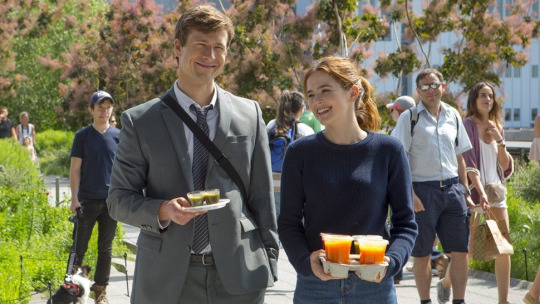
17. Set It Up (Claire Scanlon)- I guess I believe in true love now.
16. Blindspotting (Carlos Lopez Estrada)- The stylized climax is going to be polarizing, but I thought it was a heightened, artful moment whose seeds had been sown throughout. The film meanders, but its angles on subjects like gentrification and probation and identity show tenderness and openness, and Estrada's visual energy recalls early Spike Lee or Jarmusch or Aronofsky. It's worth seeing if only for its fresh sense of place.
The two leads play off each other especially well. If Daveed Diggs is the fourth lead or whatever of Hamilton, then I guess I finally have to see it.
15. Incredibles 2 (Brad Bird)- Incredibles 2 is a good example of a sequel rhyming with the original in a way that doesn’t feel like a retread. Accidentally topical in its subtext about just rule of law, the film hits upon some of Brad Bird’s ideas of exceptionalism and hope for the future while being slightly more cogent in that messaging than the original. (Slightly. The villain problem is still there. If superheroes are already illegal, then why employ and promote them at all if your goal is to make them even more illegal?)
This entry is a bit more overstuffed, less timeless, and less funny than the original. There’s nothing on the level of “Honey, where is my super suit?” which I still say to my wife fourteen years later. But the fight choreography and the textural animation take advantage of the gap in between films. The Paar family dynamic is altered only slightly, but it’s enough to re-invent the proceedings. Violet has more confidence in herself, Dash is more in control of his powers, and it’s the, yes, thicc Elastigirl who is working solo this time. Especially in the opening sequence, we see how each character’s skills complement the others’. If Finding Dory is the bar for “sequels to Pixar movies that didn’t need sequels,” then Incredibles 2 leaps over that bar.
14. Chappaquiddick (John Curran)- "We need to tell the truth. Or at least our version of it."
After the Kennedy Curse claimed JFK Jr., it seemed as if the culture reached a saturation point with Kennedy coverage. Aside from the occasional "Look who's dating Taylor Swift," we gave them their space. Who would have thought that twenty years later would be the perfect time to dust off the coldest case in the dossier?
See, now that we're having a national conversation about who gets the breaks, there's a little bit of extra weight lent to a scene of Ted Kennedy waiting for a sheriff he summoned as he drafts a statement at that absent sheriff's desk. A sheriff who then helps Kennedy to escape through a backdoor lest he answer any untoward question about his manslaughter. The film is delivered with an even pitch--especially the Jason Clarke performance that could have been overdone--but it makes no mistake about its real subject: privilege.
The attempts to keep Kennedy safe become more brazen as the film goes on, and each dodged consequence--getting Teddy's driver's license renewed on the low, for example--is balanced by Ed Helms's desperate performance as a voice of integrity. In all of the best tragedies, we know what's going to happen in the end. All along, the Kennedy Curse was that they are not like the rest of us.
13. Love, Simon (Greg Berlanti)- Can we all agree that an anonymous gossip web site for a high school is a bad idea? And that, though the film doesn't pursue this angle, the vice principal is the one maintaining it?
This propulsive, observant, and witty movie is an outright pleasure from beginning to end. Hocking spitballs at its PG-13 rating, its greatest strengths are having the courage to get dark and having the wisdom to give every supporting character his or her own moment.
0 notes
Text
Guardians Of The Galaxy Vol 2: The Empire Review
By Chris Hewitt
★ ★ ★ ★ ☆
The Plot: The Guardians Of The Galaxy — Peter Quill/Star-Lord (Chris Pratt), Gamora (Zoe Saldana), Drax (Dave Bautista), Rocket (Bradley Cooper) and Baby Groot (Vin Diesel) — are running for their lives from an alien race called The Sovereign, when they receive help from an unexpected source: Ego, The Living Planet, an ancient being who claims to be Peter’s long-lost father…
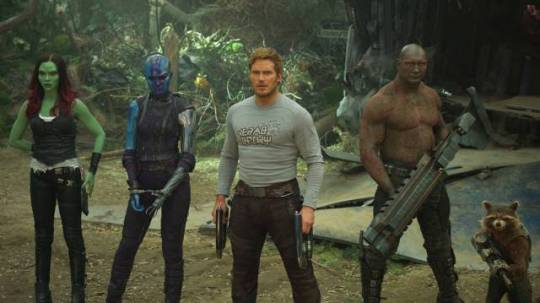
The first Guardians Of The Galaxy’s chief weapon was surprise. When the quirky quintet made their debut back in 2014, they represented Marvel Studios’ biggest gamble to date. Sure, it was the company that had taken an Aussie surfer, given him a magic hammer and still created another hit to add to its roster of box office behemoths, but the received wisdom was that a sci-fi film featuring a talking raccoon, a sentient tree, an ex-wrestler, a green warrior woman, and a roguish bloke best known for being the tubby guy in Parks And Recreation would be a step too far.
Well, received wisdom can go hang. Driven by the indie, often delightfully deranged sensibilities of its director, James Gunn, Guardians was a joy, combining humour and sci-fi action in a manner that out-Star Warsed most Star Wars movies, danced a jig at the global box office, and became a fixture on many ‘Best MCU films’ lists. In short, we were Groot.
But when you’ve lost the element of surprise, following that is no easy task. Happy to report, though, bar a few last-act wobbles and the odd tonal shift, Gunn has done it again, crafting a sequel that keeps the focus on the characters we fell for first time around while pumping up the volume.
After the success of the first one — and perhaps learning from the travails of Joss Whedon who, by his own admission, had to endure a fair amount of interference and second-guessing on Avengers: Age Of Ultron — Marvel has handed Gunn the keys to the kingdom. And that confidence is evident from the film’s credit sequence, which presents an action set-piece in a hilarious and highly unorthodox manner, while giving the incredibly cute Baby Groot a glorious moment in the spotlight and serving notice that 'Awesome Mix Vol. 2', the mix-tape that drives the film’s soundtrack, is going to be every bit as earwormy as 'Vol. 1'.
And, for the terrific first hour or so that seems to be the case with the movie as well. If the first film was about bringing this group of A-holes together, then convention dictates that the sequel should be about forcing them apart. But Gunn is clearly uninterested in what he should do and so this is actually a film about the group realising that, despite their huge differences, they function best as the universe’s most dysfunctional family. Yes, family — thematically this has a lot in common with Fast & Furious 8, with the F-word said so often it would overheat Dom Toretto’s carburettor. Almost everyone here has daddy, mummy, or sister issues, with Quill in particular finding himself in a weird version of My Two Dads, torn between the dependably swaggering Russell’s aptly-named Ego and Michael Rooker’s gnarly space pirate, Yondu. But the emotions this engenders are unexpected and genuine. Beneath the film’s sass — and there’s plenty of that again — there’s a real beating heart.
Vol. 2 is at its best when this motley crew are bickering and bantering amongst themselves (with Bautista’s wonderfully unfiltered Drax getting the lion’s share of the best lines again, including the T-shirt-worthy, "I have famously huge turds") and outside parties, this time including Ego, Pom Klementieff’s sweet Mantis and Gamora’s aggrieved sister, Nebula (Karen Gillan), given more to do this time around. Hanging out with them is so much fun that it’s a shame when Gunn finally makes a concession to convention and remembers that films like this typically have to have a) a plot and b) a villain.
With the introduction of both, that’s when the movie starts to falter. What was previously assured becomes a little abrasive and, at times, unappealing. Jokes that landed unerringly start to miss the target, including a running gag about a bad guy called Taserface that’s not as funny as it may have seemed on paper/on set/in the edit, while one sequence which is meant to be a moment of triumphant heroism comes across as a tasteless misstep. And the final battle, try as it might, can’t help but become a greenscreen jamboree.
Still, even when the pixels threaten to overwhelm, Gunn finds refuge in his main characters. There’s plenty to enjoy here, whether it’s the perfectly deployed Baby Groot moments, or a general strain of anarchic weirdness that runs all the way through the credits and which still feels unique to this franchise, not just within the MCU, but blockbusters in general. It’s easy to overlook the odd off note when a mix is this awesome.
The verdict: Perhaps not quite as fresh or fun as the original, but still very much a triumph of the Quill.
1 note
·
View note